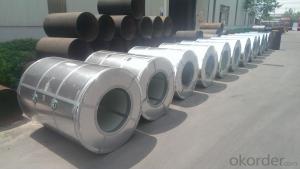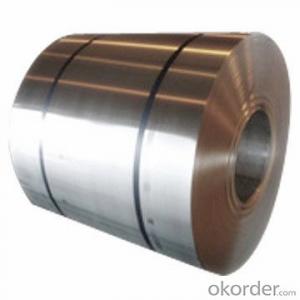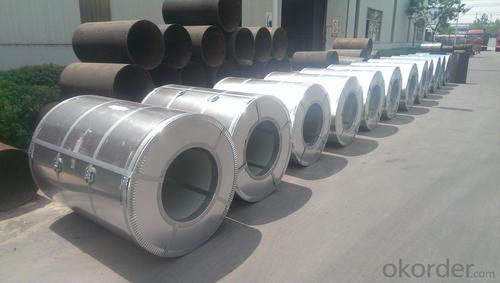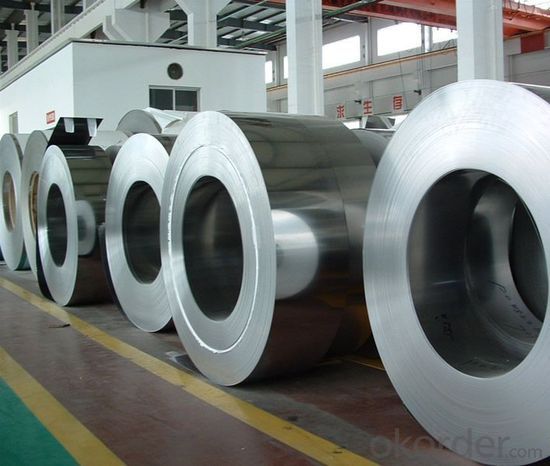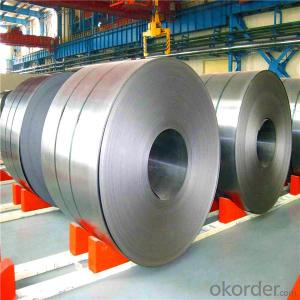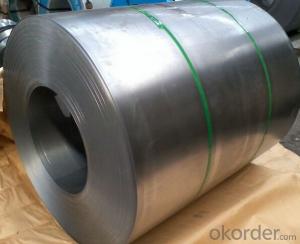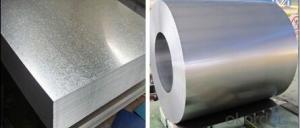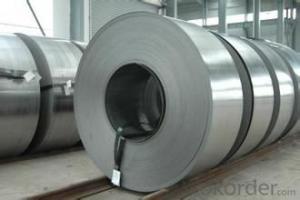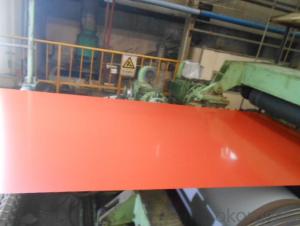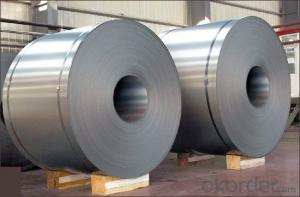Cold rolled Galvanized Steel Sheet in Coils
- Loading Port:
- Shanghai
- Payment Terms:
- TT OR LC
- Min Order Qty:
- 25 m.t.
- Supply Capability:
- 10000 m.t./month
OKorder Service Pledge
OKorder Financial Service
You Might Also Like
Cold rolled Galvanized Steel Sheet in Coils
1.Structure of Cold rolled Galvanized Steel Sheet in Coils
Cold rolled Galvanized Steel Sheet in Coils is one kinds of building material on construction.Steel sheet in melting zinc trough, the sticking of a layer of zinc sheet. At present mainly adopts continuous galvanizing process, namely the continuous roll of steel plate in the melt zinc plating tank made of galvanized steel sheet; Alloying of galvanized steel. This kind of steel plate is made by hot dip method, but after the slot, immediately heated to a temperature of about 500 ℃, it make the generation of zinc and iron alloy membrane. This kind of galvanized volumes with good coating of the sex and weldability.
2.Main Features of Cold rolled Galvanized Steel Sheet in Coils.
1) Rust-proof
2) Water-proof
3)Durable using
3. Cold rolled Galvanized Steel Sheet in Coils Images
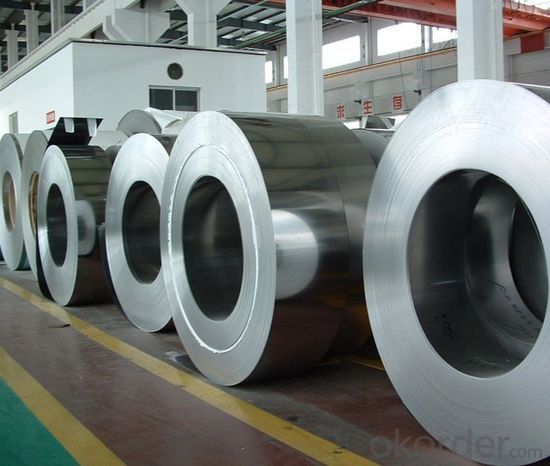
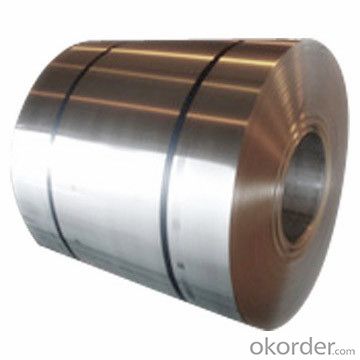
4. Cold rolled Galvanized Steel Sheet in Coils Specification
1. Base material: GI, Cold Roll, or ALU- ZINC steel
2. Pattern: can be customized according to customers requirements.
3. Suitable for indoor or outdoor decoration, color lasting for at least 10 years for outdoor using, could for roll forming.
4. Protective film can be provided according to customer needs.
5. Paint: PE or PVDF
6. Width and Thickness: width within 1250mm, thickness from 0.23-0.8
7. Please contact us for product and pattern e-catalog.
5.FAQ of Cold rolled Galvanized Steel Sheet in Coils
We have organized several common questions for our clients,may help you sincerely:
①How about your company?
A world class manufacturer & supplier of castings forging in carbon steel and alloy steel,is one of the large-scale professional investment casting production bases in China,consisting of both casting foundry forging and machining factory. Annually more than 8000 tons Precision casting and forging parts are exported to markets in Europe,America and Japan. OEM casting and forging service available according to customer’s requirements.
②How to guarantee the quality of the products?
We have established the international advanced quality management system,every link from raw material to final product we have strict quality test;We resolutely put an end to unqualified products flowing into the market. At the same time, we will provide necessary follow-up service assurance.
③How could I send the inquiry to you?
You can go to our website: www.okorder.com, find the products you need by keywords or the catalogues showing, and then send your inquiry on line there or you can email to us dirrectly.
- Q: Is condensation on steel caused from water being pulled out or is the condensation formed from the air around the steel object?
- Condensation forms when temperatures vary 'quickly'. The air itself is what provides the moisture. There you go.
- Q: How can I tell the wear resistance, strength, ect from the name of the steel?how could I tell the difference between 420 and 440 steel. what does the HC in 420 HC steel mean? what do the numbers and letters in s30v steel mean?
- So what does all that mean in the real world of knives. 420 has very low carbon by blade standards, as such it is just junk steel. There are three grades of 440, A, B and C. The amount of carbon in A is about half of what C has. (carbon is what makes steel get hard). Iron is very much like a sponge in that it can absorb and hold different alloys. These alloys give the iron different attributes, and they can magnify each other. Like a sponge iron can only hold so much, for Chromium it is around 13%. At that point the steel becomes stainless. The drawback is a loss of strength. As a bladesmith my knives are generally 59 to 60 rch, 420 and 440 at its hardest is 59 but at that it is brittle so most makers draw it down to around 57. In my test a knife made of 420 couldn't make 5 slicing cuts through rope (most couldn't make one). 440 averaged between 5 and 10. Compared to the lowest grade of carbon steel I use (5160) which average between 25 to 30 on the same rope. I have tested many stainless blades and the rule always the same, the more chromium past 13% the weaker the blade and the less edge holding ability.
- Q: I want to experiment with making steel and want to especially make it stronger. And also I want to know if its possible to turn a meteorite into steel?
- If you really want to do this, you should be getting some books on steel metallurgy rather than asking on Yahoo. ASM sells a Metallurgy for the non-metallurgist that would be a good introduction. Most university libraries will have the full ASM handbook that includes detailed information for different grades of steel (vol 1), heat treatment and surface hardening (vol 4), testing (vols 8-12), and casting (vol 15). A reference for continuous cooling transformation diagrams will also help in designing a heat treatment process. If you want to make something stronger than most commercial steels, you'll need to get into nanotechnology and unconventional steel processing methods like powder metallurgy. You can increase the strength of steel by about 1000% by reducing the grain size from 50 micron (typical for conventional processing methods) to 100 nm (achievable through high-energy ball milling). Though you'd also need to customize the chemistry to stabilize the grain size during the necessary thermal processing, I believe zirconium works well with iron.
- Q: How do steel coils contribute to the manufacturing of construction materials?
- The manufacturing of construction materials heavily relies on steel coils, as they serve as a flexible and dependable source of raw material. These coils, made from top-notch steel, are commonly used as a primary input in diverse construction processes. One of the key advantages of steel coils in construction material manufacturing lies in their adaptability to be shaped and formed into different products. These coils can be easily cut, bent, and molded, enabling the creation of a wide array of construction materials such as beams, pipes, and sheets. This flexibility empowers manufacturers to produce tailor-made construction components that fulfill specific project requirements. Moreover, steel coils provide construction materials with strength and durability. Steel is renowned for its exceptional tensile strength, making it an ideal choice for load-bearing structures and components. By employing steel coils, manufacturers can fabricate construction materials capable of withstanding heavy loads, extreme weather conditions, and other environmental factors, ensuring the longevity and safety of the final construction product. Additionally, steel coils offer consistency in both quality and performance. The manufacturing process of steel coils adheres to rigorous quality control measures, guaranteeing that the final product meets the necessary specifications. This uniformity in quality instills construction material manufacturers with the confidence to consistently produce reliable and high-performance products. Steel coils also play a role in enhancing the efficiency of construction material manufacturing. The availability of steel coils in large quantities and standardized dimensions allows for streamlined production processes. Manufacturers can optimize their operations by utilizing automated machinery and processes, reducing production time and costs, and increasing overall efficiency. In conclusion, steel coils are an indispensable component in the manufacturing of construction materials. Their versatility, strength, consistency, and efficiency make them the preferred choice for construction material manufacturers. By utilizing steel coils, manufacturers can create construction materials of superior quality and reliability, contributing to the safety, durability, and aesthetics of various construction projects.
- Q: Will a stainless steel mesh screen scratch a titanium cup, or vice versa?I have a titanium french press and am thinking about replacing the included press with an all steel one. I am worried about little flakes of titanium or steel getting ground off into the coffee when the press slides in and out. The original press has a polyester cloth for a screen, so nothing scratches.
- Steel is usually harder than titanium, at least when both materials are hear-treated to give their best strengths. And a harder material can scratch a softer one. So I imagine that the answer is that it will scratch. However much of the rest of your question is unclear and it may be that the amount of friction between the two is so small that no wear will take place, so there could be no problem. The function of the polyester cloth may be vital in reducing this friction, so that unless you keep this part of the original design, the scratching will become worse no matter which combination of metals are used.
- Q: How are steel coils used in the production of agricultural irrigation systems?
- Steel coils are used in the production of agricultural irrigation systems as they are often used to manufacture pipes and tubing. These coils are shaped and cut into specific lengths to create the necessary components for the irrigation systems. The steel material provides durability and strength to withstand the pressures and demands of distributing water in agricultural fields efficiently.
- Q: How are steel coils used in construction?
- Steel coils are commonly used in construction for a variety of applications, such as structural components, roof panels, and wall cladding. These coils are typically shaped and cut into specific lengths to meet the required dimensions of the construction project. They provide strength, durability, and versatility, making them an essential material for various construction purposes.
- Q: What are the common coil processing methods?
- Some common coil processing methods include slitting, shearing, blanking, leveling, and edging.
- Q: How are steel coils protected from extreme weather conditions?
- Steel coils are typically protected from extreme weather conditions through the application of a weather-resistant coating or paint. This coating acts as a barrier, shielding the steel from moisture, UV radiation, and other environmental elements that could cause corrosion or damage. Additionally, steel coils may be stored in covered or enclosed areas to further protect them from rain, snow, and other severe weather conditions.
- Q: What are the different types of steel coil handling equipment?
- Some different types of steel coil handling equipment include coil lifters, coil tongs, coil grabs, coil hooks, coil transfer cars, and coil upenders. These equipment are designed to safely lift, transport, and rotate steel coils during various industrial processes.
Send your message to us
Cold rolled Galvanized Steel Sheet in Coils
- Loading Port:
- Shanghai
- Payment Terms:
- TT OR LC
- Min Order Qty:
- 25 m.t.
- Supply Capability:
- 10000 m.t./month
OKorder Service Pledge
OKorder Financial Service
Similar products
Hot products
Hot Searches
Related keywords
